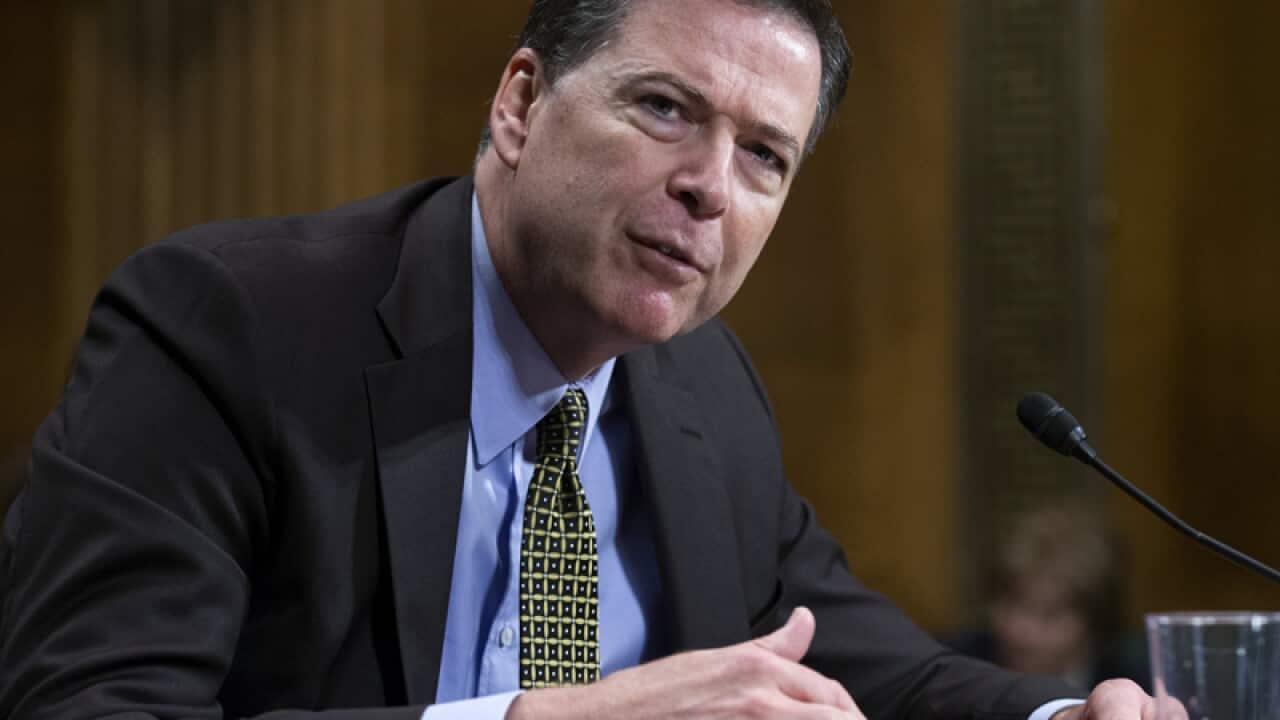Fired FBI director James Comey will soon recount a series of conversations with President Donald Trump that made him deeply concerned about the blurring of boundaries between the White House and the law enforcement agency.
The hugely anticipated testimony, which begins at midnight Thursday (AEST), is Comey's first public statements since his May 9 dismissal.
His appearance before the Senate Intelligence Committee is likely to bring hours of uncomfortable attention to an administration shadowed for months by an investigation into ties between the Trump campaign and Russia.
His account of demands for loyalty from the president, and of requests to end an investigation into an embattled adviser, are likely to sharpen allegations that Trump improperly sought to influence the FBI-led probe.
Comey's detailed and vivid recollections of his one-on-one conversations with Trump were revealed in seven pages of prepared testimony released Wednesday.
He will testify under oath that Trump repeatedly pressed him for his "loyalty" and directly pushed him to "lift the cloud" of investigation by declaring publicly the president was not the target of the probe into his campaign's Russia ties.
His remarks paint a picture of an FBI director so disconcerted by his interactions with the president that he began keeping written memos of their private discussions, including one he typed out in an FBI vehicle immediately after a Trump Tower meeting.
He'll tell the committee he believed the president was trying to create a "patronage relationship" with him, and describe in detail an Oval Office meeting in which Trump urged him not to investigate ousted National Security Adviser Michael Flynn's contacts with Russian officials.
But the ex-FBI director also will validate Trump's assertion that he was not personally a target of the federal counterintelligence investigation into possible campaign collusion with Russia.
Comey says he did offer the president that "assurance", but resisted Trump's appeals to make that information public.
"The FBI and the Department of Justice had been reluctant to make public statements that we did not have an open case on President Trump for a number of reasons, most importantly because it would create a duty to correct, should that change," Comey says in the prepared remarks.
The president's personal lawyer said Trump was cheered by the testimony.
"The president is pleased that Mr Comey has finally publicly confirmed his private reports that the president was not under investigation in any Russian probe," attorney Mark Kasowitz said in a statement.
"The president feels completely and totally vindicated. He is eager to continue to move forward with his agenda."
Comey's dismissal, four years into a 10-year term, fuelled claims Trump's ultimate aim was to quash the investigation and obstruct justice, potentially a federal crime or an impeachable offence.
Some legal experts said Comey's account could bolster such a case.
Comey notes he had nine one-on-one interactions with Trump over a four-month stretch, compared to two private conversations with President Barack Obama between September 2013 and the end of 2016.
The first meeting with Trump after the inauguration occurred on January 27, during a private dinner at the White House that Comey came to view as an attempt by the president to "create some sort of patronage relationship".
According to Comey, Trump asked if he wanted to remain as FBI director and declared: "I need loyalty. I expect loyalty."
Comey also describes at length a February14 meeting in the Oval Office in which he believed Trump asked him to back off an investigation into Flynn.
"He then said, 'I hope you can see your way clear to letting this go, to letting Flynn go. He is a good guy. I hope you can let this go,"' Comey says, according to the prepared remarks.
Trump has repeatedly cast the Russia investigation as a "hoax" and denied having any improper ties to Moscow.
According to Comey, Trump was acutely aware of the political toll of the investigation, complaining that the probe had left a "cloud" that was "impairing his ability to act on behalf of the country".









